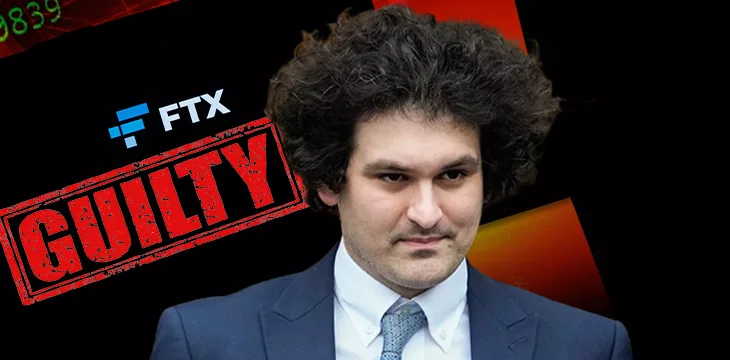| Getting your Trinity Audio player ready... |
Sam Bankman-Fried (SBF) has been sentenced to 25 years in prison for the criminal fraud that led to the downfall of his FTX exchange and the theft of billions of dollars from his former customers.
On March 28, SBF appeared in a Manhattan federal court to hear U.S. District Judge Lewis Kaplan sentence him to 300 months (25 years) in prison for the crimes that caused FTX’s demise. SBF was found guilty last November on seven counts—including wire/securities fraud, money laundering and conspiracy—that he was hit with after FTX filed for bankruptcy in November 2022 with an $8 billion hole in its balance sheet.
First, a little history: FTX imploded after someone leaked an internal balance sheet from the SBF-owned/FTX-affiliated market-maker Alameda Research that showed an unhealthy reliance on illiquid alt-coins and a corresponding lack of more liquid tokens and real-world assets. (Alameda had been using FTX as a piggy-bank to cover its own bad bets, while SBF used customer funds for investments, sponsorships and luxury real estate.) A little over a week later, FTX abruptly shut down, leaving customers in the lurch and SBF’s empire in tatters.
While many of SBF’s colleagues quickly acknowledged their guilt and struck cooperation deals with U.S. prosecutors, SBF continued to proclaim his innocence. SBF’s appearances on the stand during his month-long trial were a master class in how to annoy a judge (Kaplan) and the verdict was never much in doubt. All that was left was learning how long SBF would stay behind bars.
Given the impact of SBF’s crimes, the sentencing guidelines called for around a century of incarceration. Even the government found that a tad excessive, suggesting a mere 40-50 years would suffice. SBF’s lawyers aimed far lower, suggesting a maximum of six-and-a-half-years. Kaplan’s 25-year sentence will likely disappoint both sides.
According to the ever-reliable thumbs of Inner City Press, when Kaplan got around to reading SBF the riot act, it became all too clear what damage the fatally overconfident SBF had done to his own cause during his appearance on the stand. Kaplan claimed that “when not lying, he was evasive, hair splitting … I’ve been doing this job for close to 30 years. I’ve never seen a performance like that.”
Kaplan proceeded to excoriate “the brazenness of [SBF’s] actions. His exceptional flexibility with the truth. His apparent lack of any remorse.” Kaplan said SBF’s original narrative as the friendly, safe and compliant face of ‘crypto’ was clearly “an act.” Kaplan added that SBF “knew it was wrong. He knew it was criminal. He regrets that he made a very bad bet about the likelihood of getting caught. But he is not going to admit a thing, as is his right.”
At the conclusion of Thursday’s hearing, SBF was taken back to his cell at Brooklyn’s Metropolitan Detention Center (MDC), where he’s been since Kaplan revoked his bail last August. It remains unclear where SBF will spend the duration of his 25 years, but it’s likely to be an upgrade from the notoriously spartan MDC. Kaplan recommended a medium-security facility close to his parents’ home in California.
Federal rules allow for modest reductions for good behavior, but federal offenders must serve a minimum of 85% of their sentence. So at best, SBF is still looking at over 21 years (minus credit for time served following revocation of his bail). SBF turned 32 on March 5, meaning he’ll be nearing his mid-50s by the time he’s released. Who knows what wondrous ‘crypto’ scams could be possible by then?
Damian Williams, U.S. Attorney for the Southern District of New York, issued a statement saying SBF “orchestrated one of the largest financial frauds in history … The scale of his crimes is measured not just by the amount of money that was stolen, but by the extraordinary harm caused to his victims … Today’s sentence will prevent the defendant from ever again committing fraud.” Williams added that other ‘crypto’ crooks should know that “justice will be swift, and the consequences will be severe.”
We pause here to note that Binance founder Changpeng ‘CZ’ Zhao will face his own sentencing hearing on April 30 after reaching a $4.3 billion settlement with the U.S. Department of Justice last November. While CZ’s expecting a maximum sentence of 18 months, the government has stated it could seek up to 10 years behind bars given the severity of his crimes and CZ’s long-running efforts to evade regulatory compliance.
SBF’s math doesn’t add up
Kaplan rejected SBF’s legal argument that he deserved a break on his sentence because FTX customers would be paid back ‘in full.’ This argument failed “both on the law and on the facts” and Kaplan noted that the belief that FTX customers would be repaid at all was “speculative.”
Customers will only be paid the dollar value that various digital assets held at the time FTX filed for bankruptcy. In other words, they will not receive compensation ‘in kind,’ which would have resulted in significantly higher-value payouts. For example, the BTC token is currently trading at over 4x the $16,871 value it held at the time of the bankruptcy filing.
Kaplan noted that the only reason SBF’s team could claim that customers would be repaid ‘in full’ was due to this upward surge in token value, something that was beyond SBF’s ability to control. Kaplan likened SBF to a crook who stole money, went to Vegas, won a pile and then later tried to return what he stole and call it even.
Kaplan cited further aggravating factors in arriving at his 25-year sentence, including SBF repeatedly perjuring himself during his trial. The most blatant falsehood was his mockable claim of ignorance re Alameda improperly accessing, betting and ultimately losing FTX customer funds.
Kaplan also agreed with prosecutors that SBF was guilty of witness tampering via his post-indictment text message to his former general counsel Ryne Miller suggesting they “reconnect and see if there’s a way for us to have a constructive relationship.”
He’s not the crypto messiah, he’s a very naughty boy
SBF’s legal reps—a different team than represented him at trial—tried to downplay their client’s crimes by reciting the same hokum about SBF loving people and animals and not wanting to harm anyone. SBF allegedly “makes decisions with math in his head, not malice in his heart.” (You could almost hear Kaplan’s eyes roll.)
SBF’s team suggested that a life sentence would prevent him from ever having children, which from our view seems like a net good for society, but whatever. And his mom—who enjoyed significant lifestyle perks with the money SBF stole—says there’s “a terrific sadness at his core.” So, you know, let him skate.
When SBF was allowed to make a statement, he offered a belated “I’m sorry” but claimed that while he’d made “a series of bad decisions,” they weren’t “selfish decisions.” And SBF continued to argue that FTX didn’t fail because he had spent customers’ cash to satisfy his personal whims, it was simply “a liquidity crisis,” although he generously copped to the fact that this was “in part my doing.”
Addressing an FTX customer’s in-court statement regarding the personal impact this debacle has had on his life, SBF said “it seemed like [FTX execs] were denying there was pain. I can see how it would read that way.” SBF closed by referencing his farcical ‘effective altruism’ plans for making the world a better place and asking Kaplan for another “opportunity to do what I thought I would do for the world, not what I ended up doing.”
When it was the prosecution’s time to talk, Assistant U.S. Attorney for the Southern District of New York Nicolas Roos minced no words. Roos briefly summarized some of the many victim impact statements filed with the court, then pointed out that SBF’s words and actions—including “pervasive” perjury—indicated a serious lack of remorse and a refusal to accept responsibility for his actions.
Artificial profit
In addition to his involuntary confinement, Kaplan ordered SBF to pay $11 billion in restitution ($1.7 billion to investors, $1.3 billion to lenders, $8 billion to customers). While this enormous sum will be steadily reduced as the FTX estate continues wading through SBF’s tangled finances, he will be on the hook for any remainder. At maximum federal prison labor rates of 40¢ an hour, SBF will need to do a lot of laundry to chip away at that deficit.
Speaking of, the process of maximizing payouts to creditors continues with this week’s sale of FTX’s stake in the artificial intelligence (AI) start-up Anthropic. In 2021, SBF paid $500 million for an 8% stake in Anthropic. A collection of two dozen institutional investors has now agreed to pay a combined $884 million for the stake.
The buyers include the Abu Dhabi government-owned ATIC Third International Investment Company, which took the lion’s share ($500 million) of the stake. Other buyers include funds linked to Fidelity Investments and The Ford Foundation, as well as Jane Street Global Trading, where SBF worked pre-FTX.
The profitable sale marks a rare win for the FTX estate, which sold some of SBF’s other investments for pennies on the dollar. Last May, the FTX estate sold LedgerX’s derivatives trading platform for a mere $50 million, roughly one-sixth of what SBF paid in 2021. SBF acquired the platform in a failed bid to utilize LedgerX’s U.S. derivatives trading license without having to subject FTX to unwanted regulatory scrutiny. How’d that work out, Sam?
Watch: Blockchain as a valuable tool for law enforcement
New to blockchain? Check out CoinGeek’s Blockchain for Beginners section, the ultimate resource guide to learn more about blockchain technology.









